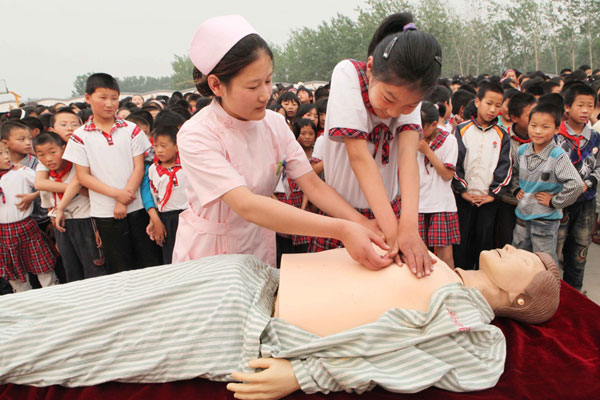First-aid training could have saved lives in storm
Updated: 2012-08-16 07:32
By Shan Juan (China Daily)
|
|||||||||||
A top specialist with the Red Cross Society of China said some of the 79 deaths from Beijing's July 21 rainstorm were due to ignorance about what to do in an emergency, and could have been avoided.
 |
|
A nurse teaches cardiopulmonary resuscitation to students at No 2 Central Primary School in Tashan township, Ganyu county, Jiangsu province, in June. Si Wei / for China Daily |
Shao Feng, deputy director of the Chinese Red Cross National Training Center, made his remarks during an interview with China Daily. The center is authorized by the central government to provide such training.
"Besides shedding tears for the tragedy, we should, more importantly, reflect on the truth that the government and the people are lacking in emergency-response skills and first aid know-how," he said.
Currently, less than 1 percent of Chinese citizens have received such training, far below a world average of 30 percent, statistics from the society show.
However, 1.2 million emergencies happen in China annually, causing about 200,000 deaths and 1.7 million serious injuries, official statistics show.
As for the rainstorm in the capital, "despite that the weather forecast issued an alert beforehand, many people still went out by car and didn't stop in front of water in underpasses. Worse, many didn't know how to escape from a submerged car," Shao said.
Also, during disaster relief, some rescuers didn't turn off electricity and then were electrocuted, he added.
In fact, workers of occupations such as disaster relief, transportation, mining, construction and electricity should be the first to get professional training in emergency response and first aid, he said.
However, many employers are indifferent about it, he said.
"They'd rather give their employees free trips rather than training that might save lives in emergencies," Shao said.
Nationwide, the government has so far done little to promote such trainings, he added.
However, most developed countries have paid great attention to the issue. In many countries, a command of emergency response and first-aid knowledge is a must for people to land a job, Shao said.
Francis Markus, a spokesman for the International Federation of Red Cross and Red Crescent Societies East Asia, said that such training gives people skills in taking care of themselves and others and confidence in emergencies.
Markus said that in Norway, 95 percent of its citizens have received such training; in Germany, Austria and Australia, it is 80 percent.
To bring the trainings to more Chinese, Shao said, the center will have to lobby for more government support.
"We're calling on the government to integrate the trainings into development plans and emergency response system building to improve the coverage," he said.
And people working at certain occupations like disaster relief and transportation and living at areas prone to natural disasters should be considered first, he said.
shanjuan@chinadaily.com.cn
Related Stories
Beijing flood death toll hits 77 2012-07-27 03:11
Beijing vows no storm death toll cover-up 2012-07-25 10:51
First-aid course held for Sichuan teachers 2009-08-26 17:03
Today's Top News
President Xi confident in recovery from quake
H7N9 update: 104 cases, 21 deaths
Telecom workers restore links
Coal mine blast kills 18 in Jilin
Intl scholarship puts China on the map
More bird flu patients discharged
Gold loses sheen, but still a safe bet
US 'turns blind eye to human rights'
Hot Topics
Lunar probe , China growth forecasts, Emission rules get tougher, China seen through 'colored lens', International board,
Editor's Picks

|

|

|

|

|

|





